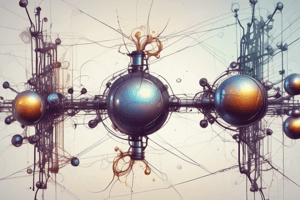Podcast
Questions and Answers
Which metal is the most reactive according to the reactivity series?
Which metal is the most reactive according to the reactivity series?
- Sodium (Na)
- Calcium (Ca)
- Potassium (K) (correct)
- Copper (Cu)
Gold (Au) is more reactive than Zinc (Zn).
Gold (Au) is more reactive than Zinc (Zn).
False (B)
What is the purpose of the reactivity series?
What is the purpose of the reactivity series?
To predict which metals can displace others from a solution of their salts.
The metal that is placed at the bottom of the reactivity series is __________.
The metal that is placed at the bottom of the reactivity series is __________.
Match the following metals with their reactivity:
Match the following metals with their reactivity:
Which of the following statements about displacement reactions is true?
Which of the following statements about displacement reactions is true?
The study of how metals react with oxygen, water, and dilute acid helps to create the __________ series.
The study of how metals react with oxygen, water, and dilute acid helps to create the __________ series.
Flashcards
Reactivity Series
Reactivity Series
A list of metals organized from most reactive to least reactive.
Reactivity
Reactivity
The tendency of a substance to undergo chemical reactions.
Displacement Reaction
Displacement Reaction
A chemical reaction in which a more reactive metal replaces a less reactive metal in a compound.
Chemical Reaction
Chemical Reaction
Signup and view all the flashcards
How to tell a chemical reaction has taken place
How to tell a chemical reaction has taken place
Signup and view all the flashcards
Reaction with Oxygen
Reaction with Oxygen
Signup and view all the flashcards
Reaction with Water
Reaction with Water
Signup and view all the flashcards
Study Notes
Reactivity Series
- Students will learn to predict which metals will displace other metals from a solution of their salts using the reactivity series.
- Students will carry out displacement reactions.
Getting Started
- Discuss with a partner how to identify a chemical reaction.
- Share ideas with another pair.
- Be prepared to share ideas with the class.
- Key words: reactivity, reactivity series, displacement reaction
Reactivity Series (Details)
- Potassium (K), Sodium (Na), Calcium (Ca), Magnesium (Mg), Zinc (Zn), Iron (Fe), Copper (Cu), Silver (Ag), Gold (Au) are listed in order of reactivity.
- More reactive metals are at the top of the series.
- Less reactive metals are at the bottom of the series.
- Metals higher in the series can displace metals lower in the series from solutions of their salts.
- Reactivity can be determined by observing reactions with oxygen, water (or steam), and dilute acid.
Studying That Suits You
Use AI to generate personalized quizzes and flashcards to suit your learning preferences.
Description
This quiz explores the reactivity series of metals and how it influences displacement reactions in solutions. Students will learn to predict which metals can displace others based on their position in the series. Engaging activities will help solidify understanding through discussions and practical examples.




